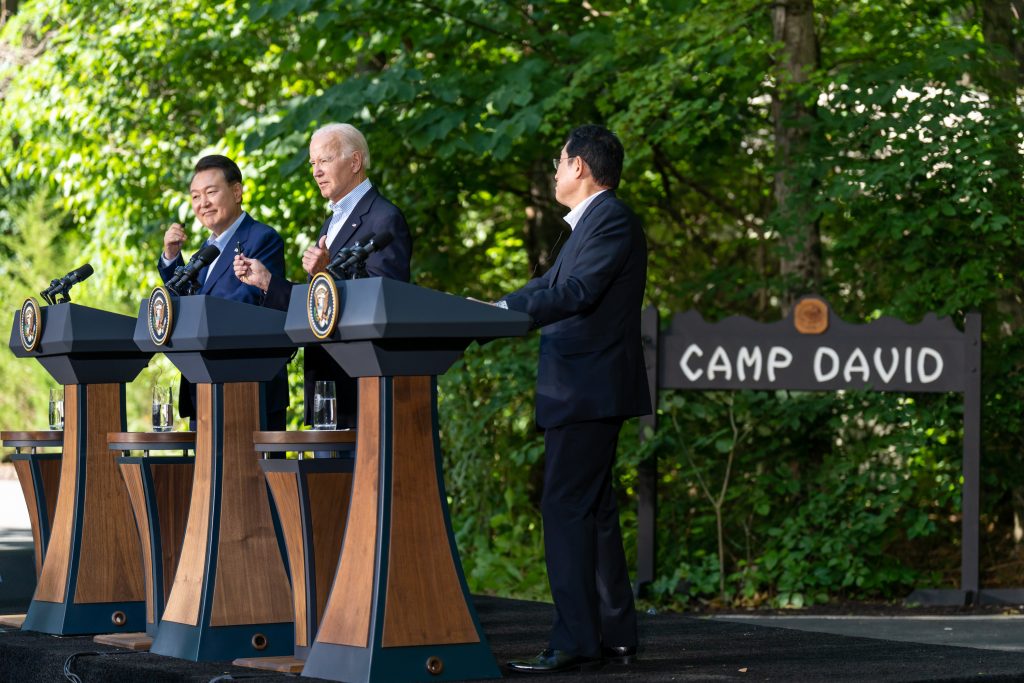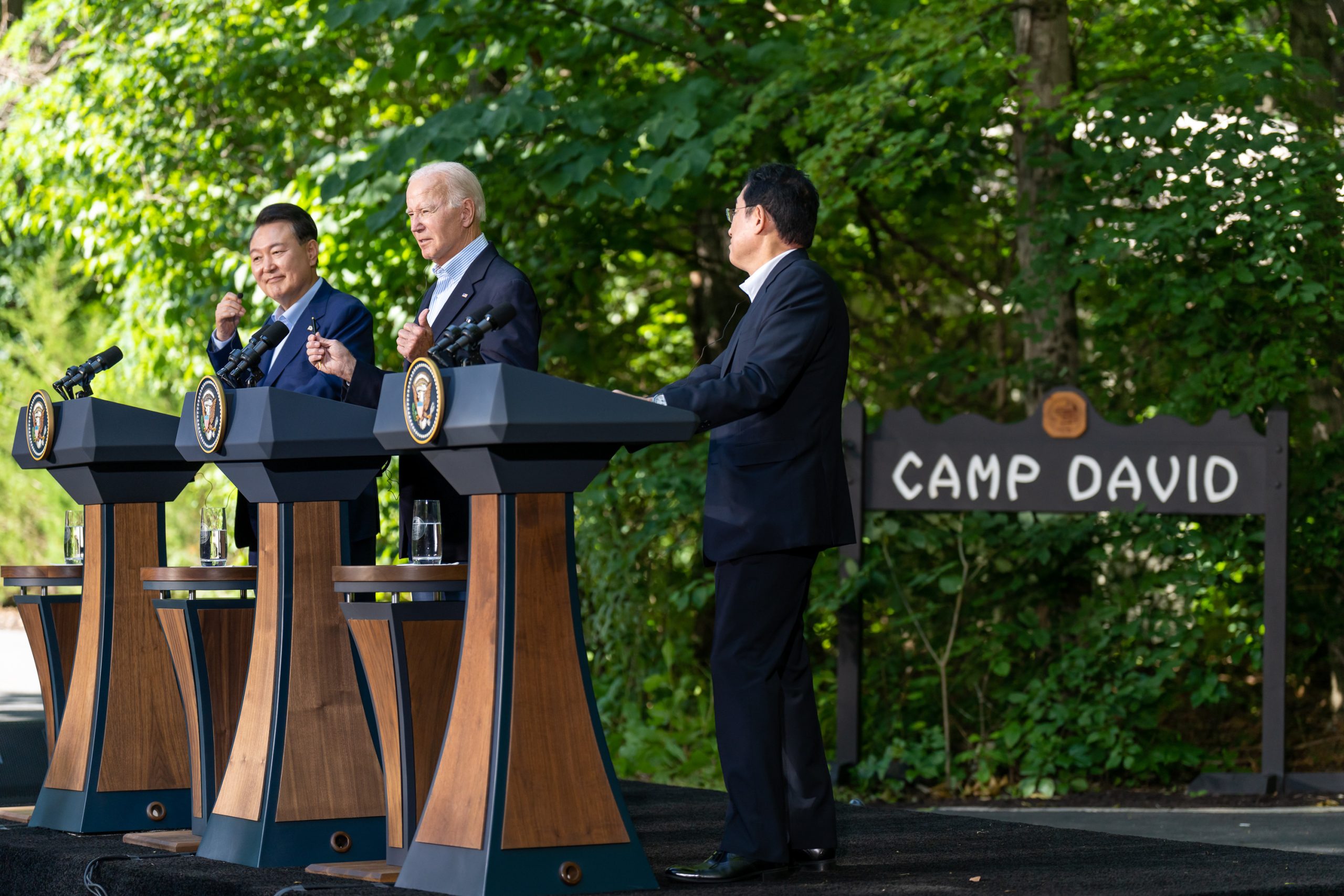
The trilateral cooperation of ROK-US-Japan accelerated following the Camp David Summit, trying to underscore its roles for a rule-based, free, and open Indo-Pacific. It continues to expand institutionalized cooperation in various areas to respond to nontraditional security issues, portraying a huge potential for regional stability.
MARCH 29, 2024

On August 18, 2023, the Korean President Yoon Suk-Yeol, Japanese Prime Minister Fumio Kishida, and US President Joe Biden met at Camp David for the historic first stand-alone trilateral summit. The three nations agreed on sharing the “Camp David Spirit” and the “Camp David Principles,” which outlined various institutionalized measures of cooperation in security, economy, and diplomacy. This trilateral partnership has marked a new era of commitment for a critical and influential role in shaping the Indo-Pacific’s security landscape, closely aligning with their respective Indo-Pacific strategies. At the same time, this partnership has expanded from merely traditional security cooperation to other nontraditional security issues, demonstrating a high potential for addressing a diverse range of regional challenges.
In the summit, North Korea was mentioned in the context of reaffirming the commitment to the “complete denuclearization of the Democratic People’s Republic of Korea (DPRK)” in accordance with relevant United Nations Security Council (UNSC) resolutions. Adding on to the reaffirmation of denuclearization commitments, one of the significant parts of the agreement was that the three nations agreed on promoting respect for human rights in North Korea as a priority. They messaged the cruciality of human rights in the DPRK as well as a commitment to immediate resolution of the issues of abductees, detainees, and unrepatriated prisoners of war in North Korea. Unlike the previous Korean administration that did not adopt a clear policy on North Korean human rights issue to continue a peaceful momentum in the Korean peninsula, the Yoon administration removed ambiguity on its stance on human rights. The Yoon administration has prioritized human rights in its approach to North Korea, as evidenced by his remarks on North Korean human rights violations during his speech on March 1st, Korean Independence Day. Its stance is in harmony with the United States’ emphasis on values-based diplomacy and Japan’s Free and Open Indo-Pacific Strategy (FOIP), both of which underscore the importance of human rights and democratic principles in their international relations. This unified approach among the three nations will serve as an effective deterrent to North Korea by facilitating the exchange of intelligence, enabling swift collective responses to security challenges, and fostering collaborative efforts to address humanitarian issues in North Korea.
Another significant part of the deliverables was that three nations have explicitly mentioned China and the Taiwan Strait in the outcomes of the summit, albeit in a measured tone, underscoring the dedication to upholding the principles of a Free and Open Indo-Pacific and freedom of navigation. For instance, the three nations noted that they “strongly oppose any unilateral attempts to change the status quo in the waters of the Indo-Pacific” and reaffirmed their commitment to the international law, referring to UN Convention on the Law of the Sea. In response to the need to counter China’s influence and manage crises in maritime straits, the Camp David Summit saw all three nations emphasizing the vital importance of collaborating with ASEAN and the Pacific Islands as part of their respective Indo-Pacific strategies. After the summit, the United States reasserted its steadfast commitment to ASEAN centrality; Japan acknowledged the alignment of its Free and Open Indo-Pacific strategy with ASEAN’s Outlook on the Indo-Pacific (AOIP); and South Korea introduced the Korea-ASEAN Solidarity Initiative (KASI) under its Indo-Pacific Strategy umbrella.This coordinated development clearly exemplifies the alignment of South Korea and Japan to the US-led initiatives, especially in response to China’s assertiveness and the Indo-Pacific dynamics.
Hence, the Principles and Spirit of Camp David have significantly enhanced the three nations’ collaborative approach to shaping Indo-Pacific security and tackling critical regional issues through shared foreign policy approaches: adherence to a rules-based order and the promotion of democratic values. Grounded in these core principles, the three nations have amplified their joint efforts in response to North Korea’s military actions and increasing influence and assertiveness of China, while broadening engagement with ASEAN to maintain their strategic leadership in the Indo-Pacific region.
As the boundaries between national security, economic interests, and advancements in science and technology increasingly blur, particularly in the face of China’s growing competitiveness in these domains, the significance of trilateral collaboration has surged. The three nations have been actively participating in the “Chip 4” Alliance, started by the US in early 2022, which facilitates informal interactions and cooperation in semiconductors and its supply chain. At the same time, Japan, South Korea, and the United States are part of the US-launched Indo-Pacific Economic Framework (IPEF) since mid-2022, aiming to strengthen economic ties and supply chain resilience across the Indo-Pacific with like-minded states. Based on the three nations’ mutual interests, the Camp David Summit deepened and reaffirmed their collaoration, broadening the scope of cooperation beyond conventional security concerns.
The three nations agreed to tackle vital issues like the resilience of semiconductor supply chains, the development of electric vehicle batteries, and the procurement of essential minerals. They also committed to collaborative efforts in essential technological domains like semiconductors, biotech, AI, quantum computing, and clean energy technolgies. This was evident in subsequent discussions, including at a recent APEC summit, that emphasized their mutual interest in advancing cooperation in areas listed on the Camp David summit.
One of the mutually beneficial areas that have huge potential of trilateral cooperation are biotechnology and space. In the biotech sector, there is marked interest from all three countries. The US set ambitious goals for its biotech and biomanufacturing sectors last year, along with President Biden’s executive order for advancing biotech and biomanufacturing in a secure American bioeconomy. With escalating tensions between the US and China in the biotech sector, South Korean biotech firms are seeking to diversify their operations away from China. This shift is supported by the Korean government’s designation of biotechnology as national strategic technology, fostering potential for enhanced trilateral cooperation. Concurrently, Japanese biotech firms and government are expressing a strong interest in partnering with South Korean counterparts, a sentiment previously echoed in the rapprochement between Korea and Japan.
The trilateral collaboration is also set to extend into the realm of space, including security measures, governance, and research and development in space technology, marking a broadening of the cooperative efforts beyond the Indo-Pacific region. Each of the three countries has shown a commitment to advancing space technology and governance: South Korea, with the recent establishment of the Korea Aerospace Administration (KASA), has ambitiously outlined plans to deploy a robotic spacecraft to Mars by 2045; Japan has unveiled a substantial $6.7 billion plan aimed at nurturing its private space industry; and the United States Department of Defense has detailed a space strategy focused on enhancing space security and the monitoring of space-related threats. Given the emphasis placed by both Japan and the United States on fostering partnerships between the government and the private sector within the space industry, there lies potential for expanded trilateral collaboration within the private space sector as well.
Overall, the “Camp David Spirit,” stemmed from the trilateral summit, is a keystone for fostering and maintaining regional harmony amid changing power dynamics. It embodies a rejuvenated dedication to enhancing diplomatic relations, harmonizing strategic aims, and reiterating a commitment to shared democratic principles among these nations, potentially marking a new chapter in trilateral cooperation. It projects huge potential in creating stability based on a rule-based order and democratic values in the region, while ensuring other global threats are mitigated. However, this partnership also faces significant hurdles. The shadows of past historical conflicts between Korea and Japan, the upcoming Korea and US elections, and varying national priorities will possibly complicate and influence the trilateral cooperation. Thus, looking ahead, the institutionalization of this trilateral cooperation will be crucial for the Indo-Pacific so that the irreversible momentum continues no matter what kind of administration comes into office.
A curated seletion of FA’s must-read stories.
Written By: SHAGNIK BARMAN
Written By: BERK TUTTUP
Written By: ABBY L’BERT
Written By: BILLY AGWANDA
Written By: HIRA SARWAR
Written By: BATUHAN GUNES
Written By: LEON REED
Written By: DARSHAN GAJJAR

SeungHwan (Shane) Kim is a Master’s candidate in Johns Hopkins School of Advanced International Studies (SAIS). His main areas of study are foreign policy, security, statecraft, and the Indo-Pacific region. He is currently working as a researcher at the Korea Foundation.
Written By: GABRIEL RAMIREZ
Written By: DILARA SAHIN
Written By: DILRUBA YILMAZ
Written By: NILAY CELIK
Written By: ELDANIZ GUSSEINOV
Written By: JOSEF SCHOEFL
Written By: SELCAN BEDIRHANOGLU
Written By: FATIH CEYLAN
FA’s flagship evening newsletter guilding you through the most important world streis ofthe day. Delivered weekdays.
